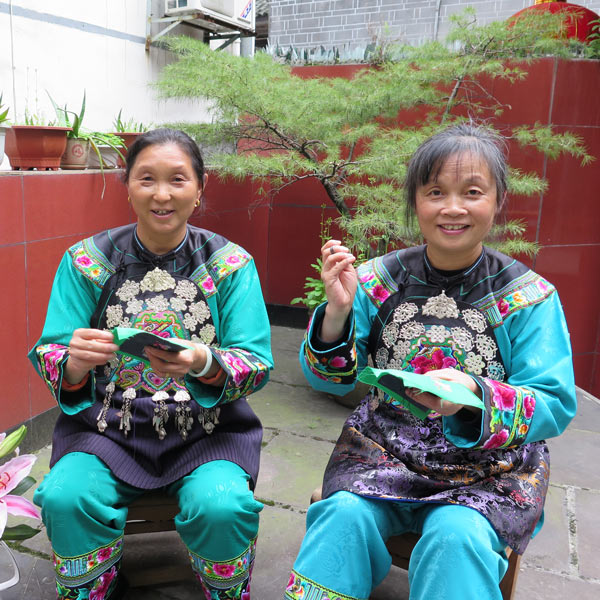
Surrounded by rice paddies in a rural area of the western part of the Hunan Province, the Miao artisans of China Ethnic Crafts are being delivered from the cycle of poverty as they sew and intricately embroider vibrant handcrafted accessories. Will and Abby Davenport* founded China Ethnic Crafts in 2004 out of their deep love for the Miao people. That year, the Davenports purchased a two-story home and created a handcrafts workshop on the second floor. They built the workshop for the express purpose of blessing the Miao people and encouraging them to bring new life to embroidered Miao folk designs.
“The women who work here have become like family to us as we live, work, and fellowship together; sharing the kitchen, garden, and living areas.”
A Unique Workshop
The China Ethnic Crafts workshop is quite different from the local sweatshops where women are forced to work 12 hours a day in crowded, inhumane conditions. Instead, the Davenports have worked diligently to ensure that their workshop is a nice, comfortable place for their artisans. The workshop is heated and air-conditioned, and the windows open so that the artisans can get outside air when they wish. The artisans who work here are given the opportunity to work with excellent equipment and high-quality supplies. They work regular hours with adequate lunch breaks, and they receive 17 paid holidays.
A Unique Collaboration
The creation of China Ethnic Crafts’ products is a collaborative effort between seamstresses and embroiderers. Nine women sew in the workshop, and 15 women in the village do the embroidering. At the workshop, seamstresses cut the cloth, and then one seamstress silk-screens the Miao folk design on the fabric. After the silk-screening process, a backing is applied to the fabric. The fabric is then ready for the embroiderers who come to the workshop to get their design templates. The embroiderers take the fabric and threads back to their homes to complete the designs. Upon completion, the work is returned and inspected for quality, and the artisans are paid. Mrs. Davenport shared that several of these embroiderers are actually in their 80’s. Their work with China Ethnic Crafts ensures that the elderly women have proper nutrition and physical care.
A Unique Family
Mrs. Davenport says, “The women who work here have become like family to us as we live, work, and fellowship together; sharing the kitchen, garden, and living areas.” Each artisan is cared for and loved. They are given access to healthcare and preventive medicine, and the Davenports regularly ensure that the artisans are receiving eye exams. In addition, China Ethnic Crafts covers 50% of the artisans’ children’s college tuition in an effort to sustain the family’s flight from poverty.
A Unique Goal
China Ethnic Crafts’ goal is “to give this kind of employment to as many of the local Miao women as are interested so that they might have satisfying employment doing something that carries forward the traditional Miao embroidery skills.”
From travel accessories like the Butterfly Jewelry Roll, Chinese Flower Cosmetics Bag, to everyday essentials like the Asian Blossom Purse, Asian Blossom Eyeglasses Case, and Asian Blossom Wallet, the handcrafted accessories of China Ethnic Crafts represent the revival of a dying art and the renewal of life for formerly impoverished families. By purchasing China Ethnic Crafts products through WorldCrafts, you have a unique opportunity to help free these artisans and their families from poverty and domestic abuse and to introduce them to the promise of eternal hope.
*names changed

